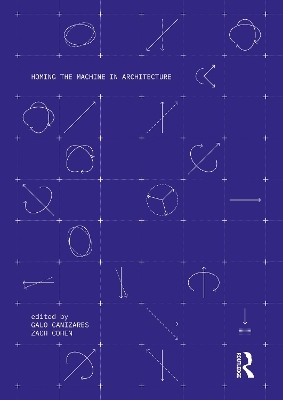
Homing the Machine in Architecture
Routledge (Verlag)
978-1-032-28370-8 (ISBN)
To “home” a digital fabrication machine is to send it back to its origin point—a point that can be specified by the fabricator in advance of the fabrication process or by the defaults that are pre-programmed into the machine. The homing process is necessary and productive since it determines the physical point at which the machine (and the maker) begin making—every time that architectural designers begin to digitally fabricate something new, they first need to home the machine. This book gathers first- and second-hand accounts of the origins of individual “digi-fab” practices from the emergence of advanced prototyping tools to the contemporary moment. It features interviews, essays, and case studies organized around three questions: What are the possible histories of digital fabrication in architecture? How do designers orient themselves in this emergent discipline? What conceptual original points do architectural designers return to when they home their machines?
The discourse that emerges from this collection aims to reach practicing architects using digital fabrication, as well as upper-level students and academics of digital architecture, architectural theory, and architectural history.
Galo Canizares is a designer, writer, and educator. His work blends absurdity, computation, world-making, simulation, and parafiction to address issues in technology and the built environment. He is currently researching the sociotechnical networks of relations between design’s softwarization and the architectural imagination. Galo was the recipient of the 2016–17 LeFevre ’29 Emerging Practitioner Fellowship, and in 2018 was awarded the Christos Yessios Visiting Professorship at The Ohio State University. His collaborative architectural practice, office ca, won the 2018 Ragdale Ring competition. He is currently Assistant Professor of architecture at the University of Kentucky College of Design where he directs the Critical Software Lab. Zach Cohen is a designer, researcher, and educator. His research and teaching examine the ways in which architects can use digital fabrication technologies to reimagine both the immaterial and physical labor of architectural design. From 2019 to 2021, Zach was the Christos Yessios Visiting Assistant Professor at the Knowlton School of Architecture at The Ohio State University. Prior to his time at Knowlton, he was a Research Lead at the Self-Assembly Lab at the Massachusetts Institute of Technology. Zach is currently an Adjunct Assistant Professor at The Cooper Union, where he teaches courses centered on what he calls “theoretical digital fabrication.” He is also the co-founder and partner of the Brooklyn-based architectural design practice, common craft, which presently has a variety of commercial and residential construction projects in and around New York City.
Homing 1 Introduction Galo Canizares and Zach Cohen 2 Homebound Theodora Vardouli The Technological 3 Lost and Found: In Search of a Process for Creating Productive Problems Michael Szivos 4 Not Not Digital Fabrication Machines Maria Yablonina 5 Beyond Optimization: Interaction as a Means to Resituate Digital Fabrication Stefana Parascho 6 Wind-Up Architecture: An Interview with Marshall Prado Marshall Prado and Zach Cohen The Material 8 The Ends of the Machine: From Technical Means to Architectural Beginnings Leslie Lok and Sasa Zivkovic 9 Working with Forests Zachary Mollica 10 Ecotectonics: Using Digital Fabrication Towards Multispecies Design Ehsan Baharlou 11 Failing Matters: An Interview with Skylar Tibbits Skylar Tibbits and Zach Cohen 12 A Robot Named Heidegger Mark Jarzombek The Social 13 Construction Cheat Codes James Coleman and Nathan Barnes 14 Eco-Digital Construction in Africa: Decolonizing Performative A rchitecture from the African Fabbers Project to the Douala Cultural Hub Paolo Cascone and Maddalena Laddaga 15 Machine Not Homed: Growth and Perspectives on Digital Fabrication Made in Latin America Pablo C. Herrera 16 A Carrier Bag of Tools for Computational Feminism Shelby Doyle 17 Situated Computation: An interview with Vernelle A. A. Noel Vernelle A. A. Noel and Galo Canizares Epilogue 18 Beyond Default Thinking: A Conversation with Behnaz Farahi, Dr. Madeline Gannon, Mollie Claypool, and Galo Canizares
| Erscheinungsdatum | 13.03.2024 |
|---|---|
| Zusatzinfo | 1 Tables, black and white; 3 Line drawings, black and white; 20 Halftones, color; 185 Halftones, black and white; 20 Illustrations, color; 188 Illustrations, black and white |
| Verlagsort | London |
| Sprache | englisch |
| Maße | 174 x 246 mm |
| Gewicht | 752 g |
| Themenwelt | Naturwissenschaften ► Biologie ► Ökologie / Naturschutz |
| Technik ► Architektur | |
| ISBN-10 | 1-032-28370-X / 103228370X |
| ISBN-13 | 978-1-032-28370-8 / 9781032283708 |
| Zustand | Neuware |
| Informationen gemäß Produktsicherheitsverordnung (GPSR) | |
| Haben Sie eine Frage zum Produkt? |
aus dem Bereich


